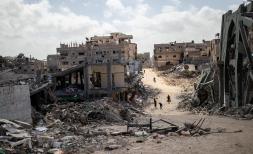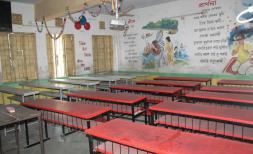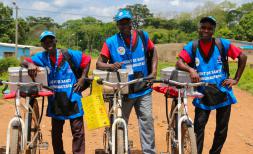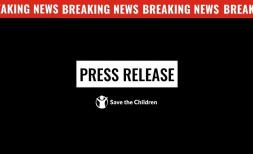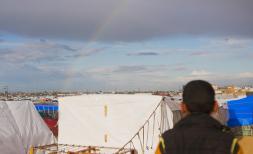Children of Mongolian nomads forced to abandon herding by climate change
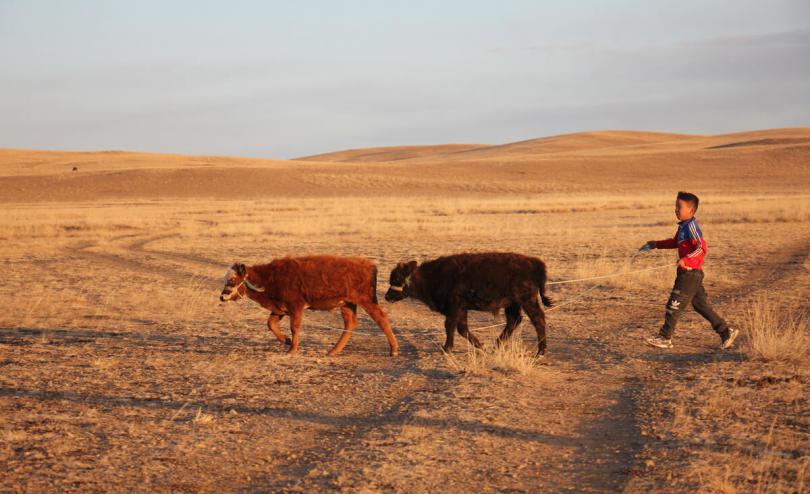
ULAANBAATAR, 27 November 2023 - Mongolian children are abandoning nomadic herding in rising numbers due to climate change for life in the world’s coldest capital city where they face suffocating pollution and employment uncertainty, Save the Children said.
More than 30% of the Mongolia’s 3.4 million population still live a traditional nomadic life, dependent on livestock, including cattle, camels, goats, sheep, yaks and horses but they are under threat, with Mongolia one of the most vulnerable countries to climate change.
Rising temperatures and more frequent dzuds - a natural phenomenon when a hot summer is followed by a harsh winter that kills crops and freezes livestock to death – is accelerating the rate at which families and children are forced off the land.
Dzuds used to happen once a decade but have occurred for the past three consecutive years. Meanwhile temperatures have risen by about 2.25 degrees Celsius over the past 80 years, which is 2.5 times higher than the global average, with rising temperatures a key focus of the COP28 climate summit in Dubai this month.
In Mongolia’s Uvurkhangai province alone, there have been over 78 extreme weather events this year, including dzuds, sandstorms, and snow storms, that have led to land degradation and desertification reducing the amount of pasture land.
Urgakhnar, 37, is from Uvurkhangai province and has three children (aged 13, 11 and 6). She comes from generations of nomadic herders and left school at 15 to herd full time herself, never considering any other livelihood.
She married a fellow herder when she was 24 but they have found life harder and harder in recent years due to climate change.
They lost about 40 livestock in the most recent dzud leaving them with about 100 but with debts to pay for fodder, one of many herding families taking loans to feed their animals ending up in a cycle of debt that can spiral into poverty.
“Since I was young, we are now getting less rain and more droughts and more severe weather. This is limiting grazing land. It is getting worse and worse every year,” she said, sitting in her ger (circular tent or yurt) offering bowls of mare’s milk, handmade cheeses, and traditionally cooked mutton.
“Life as a herder has become very hard. We have to move further and further to find better pasture and now we have to travel for up to 400 kms when before it was 40-50 kms.
“We leave our children for two to three months with their grandparents. It is very difficult for them and for us but what else can we do to make sure our livestock survive?”
While the climate crisis is impacting the livelihood and nomadic herding culture that is core to Mongolia, Urgakhnar said herding is not a future she wants for her children.
“I don’t want my children to be herders. I want them to go to school and university and have a better life. With climate change like this I am afraid that young people will not want to become herders, and it is sad to see traditions ending.”
Her 13-year-old daughter Suvd-Erdene was adamant that she would not become a herder with an ambition to train as a teacher.
The dzud of 2022-2023, hit the livelihoods of 200,000 people and left thousands, including 80,000 children, in need of humanitarian aid. During the past two dzuds 25 to 33% of the national herd were lost.
Many herders who have lost their livestock migrate to Ulaanbaatar, where they live in gers on the outskirts of the city, burning wood and coal to keep warm as winter temperatures plummet to -40 Celsius (-40 Fahrenheit).
Pollution levels in Ulaanbaatar are 27 times higher than global guidelines, according to the World Health Organization, making it one of the most polluted capital cities in the world with children the most vulnerable to related health issues.
This shift to cities has created new challenges for the younger generation with demand for kindergartens and schools outstripping supply and children needing an education level and practical skills which were unknown to their parents so they can build a better future.
Batbaatar, 43, is a former herder who migrated to Ulaanbaatar from western Mongolia in 2010 after a dzud wiped out his herd of about 300 livestock.
He now lives in a ger in the city with his wife and four children, working as a forklift truck driver. In August this year, their ger was flooded after mass flooding across the city. Save the Children provided them a new ger and school uniforms and supplies for their children.
“I miss my livestock and I miss being a herder. City life is busy and having children in this polluted air is very difficult,” he said.
“I never thought I would settle in Ulaanbaatar city. I thought I would find a job, work, then buy livestock again and go back to herding. But I was also hesitant about another dzud and losing my livestock again
“Now I have debts with loan after loan, and the children are at school here. Living in the countryside is much better… but I want the children to have a good education and get jobs in a good company, not become herders. I never want my children to be like me.”
His 17-year-old daughter, Altantsetseg, said that it is difficult for young people in Ulaanbaatar, so she wants to study and live overseas in Korea, to increase her chances of employment after she finishes high school.
“Deep in my heart, I want to contribute and develop my country, but in Korea, it is better, so that’s why I want to leave,” she explained.
Bayan-Altai Luvsandorj, Country Manager and Representative of Save the Children Japan’s Mongolia Programme, said:
“Children in Mongolia are living at the front lines of the climate crisis, whether they are being pushed out the country side or surrounded by smog pollution in Ulaanbaatar. Mongolia faces rates of warming far higher than the global average.
“The intensity of extreme climate-driven hazards including heatwaves, droughts and river flooding is expected to increase putting a greater number of Mongolia’s children’s lives at risk and forcing them to seek their futures elsewhere.
“The international community must step up and support Mongolia’s climate ambitions, also working to limit global warming to 1.5 degrees.”
Mongolia has ratified the Paris Agreement and set a target to reduce greenhouse gas emissions by 22.7% by 2030 if carbon capture and waste-to-energy technology is implemented. The country has committed to spend 1% of its GDP annually to mitigate the effects of climate change and desertification including a promise to plant one billion trees.
Save the Children has worked in Mongolia since 1994 running programmes focused on education, child protection, health, and addressing child poverty and child rights governance as well as providing humanitarian assistance to herder households affected by dzuds, floods and sandstorms.
ENDS
Notes to editors:
- Save the Children’s humanitarian response to the 2021 Sandstorm was implemented with funding from the Japan Platform, and to the 2022-2023 dzud with funding from the START Fund of the UK, the Humanitarian Fund of Save the Children International, Save the Children Japan and the Swiss Cooperation Office of the Embassy of Switzerland in Mongolia.
We have multimedia content for this release here: www.contenthubsavethechildren.org/Package/2O4C2S3MXE2F
*******************************************************************************************************************
For further enquiries please contact:
- Save the Children’s Global Media Unit GMU@savethechildren.org
- Our media out of hours (BST) contact is media@savethechildren.org.uk / +44(0)7831 650409
